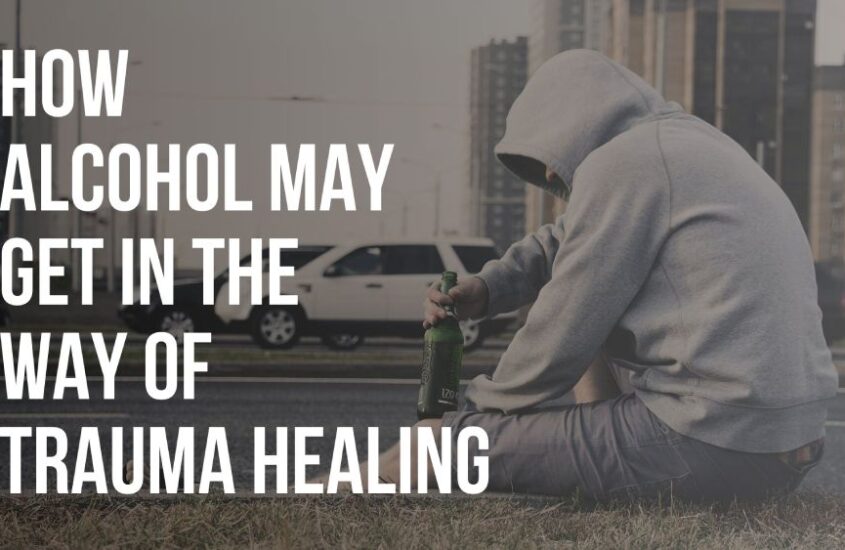How Alcohol May Get in the Way of Trauma Healing

While we often think of trauma as being purely psychological in nature, the truth is more nuanced. In fact, trauma can best be understood as a complex physiological process stemming from our fight-or-flight instinct. During emotionally or physically traumatic situations, our body responds by flooding our system with stress hormones like cortisol and adrenaline. Those hormones are part of our natural self-defense mechanisms, evolved to help us survive. Memories of traumatic experiences are stored differently in our brains — and healing from trauma is a delicate process.
In today’s article, we’ll discuss how alcohol may get in the way of healing trauma.
Alcohol as Self-Medication
People drink for many reasons — some people find that it helps with social anxiety while out and about at bars or use it to take the edge off of a particularly stressful day at work. It lowers inhibitions and can dull not only our senses but also the sharpness of our emotions. At first blush, it may seem like a harmless pastime, but the same processes that make alcohol effective in that fashion also make it dangerous when abused, especially over time.
From a therapeutic perspective, alcohol isn’t a cure. Rather, it’s a form of avoidance. While it may feel good in the moment, it hinders our ability to recognize and confront the way trauma may be impacting our lives.
Alcohol’s Effect on the Brain
If we understand trauma as a physiological phenomena, it becomes easier to examine how alcohol impacts our ability to recover from trauma. Alcohol dulls the performance of our brain’s neurotransmitters—dulling our ability to feel emotions and regulate anger. Because alcohol is often seen as a socially acceptable drug, we don’t always recognize its long-term impacts. Even when a person doesn’t feel they’re drinking to excess, alcohol can change the function of our brain.
Some common changes include:
- Issues with recall or memory
- Impaired ability to make decisions
- Emotional numbness or detachment
Alcohol as an Engine for Trauma
In addition to alcohol’s effect on the brain, it serves as a destructive force in other ways. Under the influence of alcohol, people often say or do things they later regret — some of which cannot be easily undone. With that understanding, it’s possible to see that alcohol is both engine and fuel; it leads to trauma, shame, and regret. Those feelings of shame and regret, in turn, drive many to further self-medicate with alcohol. The net result is a cruel cycle that is difficult to escape from.
Healing from Trauma
While alcohol may hinder our ability to recover from trauma, our brains are capable of tremendous feats of self-healing. When we approach trauma with the understanding that it is both a physiological and emotional phenomenon, it allows us to find more permanent ways of managing our trauma. We can promote healing through lifestyle changes that help regulate brain function and the balance of hormones in our bodies. In addition, several therapies have proven especially effective in treating trauma. Eye Movement Desensitization and Reprocessing (EMDR) therapy, for example, heals traumatic memories via a mechanism that allows us to access and reprocess those memories.
Lifestyle Changes
Our bodies are connected to the world around us. Everything from what we eat to the environment around us impacts our physical and emotional health. Accordingly, self-care is often a critical step in learning to recover from trauma. A proper diet and even a small amount of exercise can help regulate the function of the brain and restore balance to our body’s hormones. It’s a way we show ourselves love, which is critical to overcoming feelings of guilt and shame related to past trauma.
Schedule an Appointment
If you’re interested in learning more about how alcohol hinders the healing of trauma, reach out to schedule a consultation today. Our therapists specialize in helping people understand and process past trauma — providing you with the support you need to confront the past rather than avoid it.
Sheryl Reto, MSW.LCSWA. EMDR trained
- Specialties: trauma and PTSD, anxiety, grief and loss, depression, self-esteem, life transitions, teen counseling, terapia en español.
- In network with Aetna, BCBS (most plans), CBHA and Cigna/Evernorth, accepts out of network and self pay






